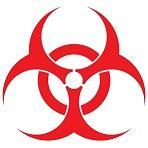Biosafety Program

Florida Institute of Technology (Florida Tech) is committed to providing a safe and healthy environment. The goal of the Institute's Biosafety Program is to protect the researchers, staff, and students from exposure to infectious agents, to prevent environmental contamination, to enhance the research atmosphere, and to comply with federal, state, and local regulations as well as industry standards.
Bloodborne Pathogens Plan
The Bloodborne Pathogens Plan has been developed as part of the Florida Tech’s Biosafety Program to ensure that all employees are protected from the risk of exposure to bloodborne pathogens, such as the Human Immunodeficiency Virus (HIV) and the Hepatitis B Virus (HBV). The plan has been developed in accordance with the regulations set forth in the Occupational Safety and Health Administration's (OSHA), 29 CFR 1910.1030: Occupational Exposure to Bloodborne Pathogens Standard.
This plan is applicable to all employees, students, and researchers who could be "reasonably anticipated", as the result of performing their job duties, to come in contact with blood and Other Potentially Infectious Materials (OPIM).
Florida Tech Bloodborne Pathogens Plan
Biomedical Waste Plan
The Biomedical Waste Plan is Florida Tech’s Plan for management of biomedical waste production, handling, storage, and disposal. Biomedical waste requires careful containment and disposal before collection and consolidation for treatment. Through OSHA’s Bloodborne Pathogens Standard (29 CFR 1910.1030) initial measures for discarding regulated medical-waste items are addressed. These measures are designed to protect the workers who generate medical wastes and who manage the wastes from point of generation to disposal.
The State of Florida under Chapter 64E-16 Florida Administrative Code (F.A.C.) outlines the minimum sanitary practices relating to the management of biomedical waste, including segregation, handling, labeling, storage, transport, and treatment. This chapter applies to all facilities that generate, transport, store, or treat biomedical waste to ensure that the waste is properly handled to protect public health. Further, this chapter prescribes minimum standards for permitting and registration entities involved in biomedical waste from any aspect.
Biosafety Cabinet Usage
A Biosafety Cabinet (BSC) is the primary means (engineering control) of containment developed for working safely with infectious microorganisms. Class II BSCs, the most common cabinets used in laboratories, are designed to provide personnel protection (for you and those around you), product protection (for your samples), and environmental protection. Individuals inquiring more information on the different types of BSC’s, their proper usage/limitations, and to better understand how to utilize these units effectively and safely should contact the EHS. There are many resources that can be made available at no cost to the researcher.
SPECIAL NOTE:
All BSC’s are required to be certified for performance by an outside (third-party) vendor upon installation, whenever moved, upon major repairs (blower unit or HEPA filter), and least annually thereafter. The EHS Office will cover the cost of routine annual certification; however, all costs associated with repairs must be absorbed by the individual department utilizing the unit.
Controlled Substance Safety Plan
A number of substances regulated by the United States Drug Enforcement Administration (DEA) and other agencies are used for research and instructional purposes at Florida Tech. These substances are known as "controlled substances," and their possession and use are governed by regulations that require established procedures to ensure safety and prevent abuse. The Controlled Substance Safety Plan (CSSP) describes responsibilities and procedures for those individuals who are authorized to work with controlled substances at Florida Tech.
The CSSP sets forth Florida Tech’s guidelines to ensure that the university’s research and instructional activities involving the receipt, use, disposition, and disposal of controlled substances are carried out in accordance with these federal and state regulations.
Infectious Disease Response Plan (IDRP)
The IDRP has been created to better prepare for a possible infectious disease (agent) incident or an outbreak (commonly referred to as a “pandemic”). It outlines guidance for the steps the university to take before, during, and after an outbreak to further reduce/eliminate the possibility of infectious agent exposure to employees, students, residents, and the general public


 Give to Florida Tech
Give to Florida Tech 